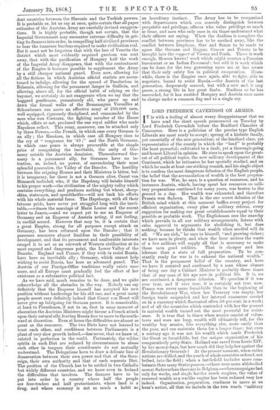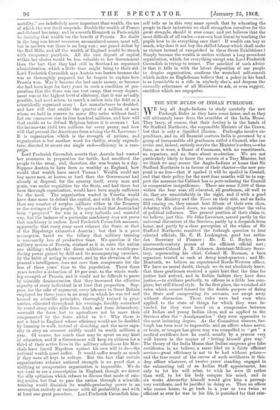LORD FREDERICK CAVENDISH ON ARAM'S.
IT is with a feeling of almost weary disappointment that we have read the short speech pronounced on Tuesday by Lord Frederick Cavendish before the Bradford Chamber of Commerce. Here is a politician of the precise type English Liberals are most ready to accept; sprung of a historic family, yet essentially of the new generation; of the landlord class, yet representative of the county in which the "land" is probably the least powerful; cultivated to a fault, yet a thorough-going and honest Liberal in opinion. He rises to speak upon the great- est of all political topics, the new military development of the Continent, which he intimates he has specially studied, and on which he made at least one striking remark, and his single object is to confirm the most dangerous delusion of the English people, the belief that the accumulation of wealth is the best prepara- tion for war. War, he says, is a question of resources, and he instances Austria, which, having spent her resources on mili- tary preparations continued for many years, was beaten to the ground in a day. Her wealth was exhausted, and therefore Prussia won Sadowa. That is the one secret delusion of the British mind which at this moment baffles every project for efficient organization, every plan of military reform, every suggestion for making our great establishments equal to their possible or probable work. The Englishman sees the anarchy which prevails in all our military arrangements, listens with calm approval to arguments for abolishing it, but does nothing, because he thinks that wealth when needful will do all. "We are rich," he says to himself, "and growing richer; we have men in plenty, and when the hour arrives the waste of a few millions will supply all that is necessary to make those men good soldiers. That is cheaper and less irksome than a state of full preparation. To be con- stantly ready for war is to exhaust the national wealth." That is the permanent belief of the country, and here we have it restated and confirmed by a man whose chance of being one day a Cabinet Minister is probably three times that of any man of his age now in political life. It is, we are convinced, a dangerous delusion. We question if it was ever true, and if ever true, it is certainly not true now. France was never more formidable than in the beginning of the Revolutionary War, when her Treasury was empty, her foreign trade suspended, and her internal commerce carried on in a currency which fluctuated often 50 per cent. in a week; and of all the countries which contended with her the poorest in material wealth turned out the most powerful for resist- ance. It is true that in times when armies consist of volun- teers and wars are long, wealth will ultimately tell, for the wealthy buy armies, like everything else, more easily than the poor, and can maintain them for a longer time ; but even a century ago it was not his wealth which made Frederick the Great so formidable, but the unique organization of his comparatively petty State. Holland was saved from Louis XIV. by her money-bags, but how much did they help her against the Revolutionary Generals ? At the present moment, when entire nations are drilled, and the youth of whole countries ordered, not bribed, into the field ; when a battlefield includes more com- batants than many States possess,—there were more ablebodied men at Sadowathan thereare in Belgium,—when campaigns last only for weeks, and single battles crush empires, the value of reserved wealth as a warlike engine has been reduced very low indeed. Organization, preparation, readiness to move at an hour's notice, all that we include in the two words "military
mobility," are indefinitely more important than wealth, the use of which the war itself suspends. Double the wealth of France and disband her army, and in a month Bismarck in Paris might be draining that wealth for the benefit of Prussia. No doubt in the long run latent resources, accumulated means, must tell, but in modern war there is no long run ; one grand defeat by the Red Hills, and all the wealth of England would be struck with temporary paralysis. All the vast deposit of capital within her shores would be less valuable to her Government than the fact that they had still in Scotland an organized administration, which a little time might bring to their aid. Lord Frederick Cavendish says Austria was beaten because she was so thoroughly prepared, but he forgets to explain how Prussia won. Was it because she had made money, or because she had been kept for forty years in such a condition of pre- paration that the State was one vast camp, that every depart- ment was at the highest level of efficiency, that it was actually possible, had need arisen, to march a nation into the field as a scientifically organized army ? Let manufactures be doubled, and how will that enable the quarter of a million of men whom we hold in reserve to move fifty miles without food ? Let our commerce rise to four hundred millions, and how will that enable us to defend Belgium before it is overrun ? Let the income-tax yield two millions for every penny, and how will that prevent the Americans from seizing the St. Lawrence ? It is organization which is the strength of nations, and organization is but another word for thrifty, steady expendi- ture, directed to secure one single end—efficiency in a cam- paign.
Lord Frederick Cavendish asserts that Austria had wasted her resources in preparation for battle, had sacrificed the people to the army, and, therefore, she was beaten in a day. Suppose Austria to have been as wealthy as England, how would that wealth have saved Vienna ? Wealth could not buy more men, or horses, or food than the Government had already at disposal, for the country itself, every man and grain, was under requisition for the State, and had there but been thorough organization, would have been amply sufficient for the need. The organization wasted in Venetia would have done more to defend the capital, and with it the Empire, than any number of surplus millions either in the Treasury or the cottages of the people. We quite admit that Austria had been "prepared " for war in a very imbecile and wasteful way, but the badness of a particular machinery does not prove that machinery is useless. Lord Frederick Cavendish assumes, apparently, that every army must exhaust the State as that of the Hapsburgs exhausted Austria ; but that is a pure assumption, based on the fallacy that military training is necessarily loss of productive time. We question if the military system of Prussia, strained as it is, costs the nation one shilling ; whether the direct addition to its wealth-pro- ducing power gained by drill and its accompanying exercises, by the habit of acting in concert, and by the elevation of the peasant's intelligence, does not more than compensate for the loss of three years' time to the population. Those three years involve a deduction of 10 per cent. to the whole work- ing strength of Prussia, and it would not be difficult to prove by scientific demonstration that they increased the effective capacity of every individual in at least that proportion. Sup- pose, for the sake of argument, every labourer in Great Britain employed for three years in an army in which he was fed and housed on scientific principles, thoroughly trained in gym- nastics, educated throughout his evenings, forcibly restrained by sound camp rules alike from drink and from debauchery, —would the force lost to agriculture not be more than compensated by the force added to it ? Why there is not a hind in England whose efficiency would not be doubled by learning to walk, instead of slouching, and the mere capa- city to obey an overseer swiftly would be worth millions a year. Of course, too much time may be spent on any kind of education, and if a Government will keep its citizens for a third of their active lives in the military school—as his Mar- shals have forced Napoleon against his own will to do—the national wealth must suffer. It would suffer nearly as much if they were all kept in college. But the fact that certain organizations exhaust national strength is no proof that a vivifying or recuperative organization is impossible. We do not want to see a conscription in England, though we detest the silly optimism which refuses to discuss that mode of rais- ing armies, but that to pass the nation through a scientific training would diminish its wealth-producing power is an assumption entirely at variance with all probability, and with at least one great precedent. Lord Frederick Cavendish him-
self tells us in this very same speech that by educating the people in their industries we shall strengthen ourselves for the great struggle, should it ever come, and yet believes that the most difficult of all trades—war—is best learnt by teaching the pupils how to do everything save that 1 If wealth can buy so much, why does it not buy the skilled labour which shall make us victors instead of vanquished in these Great Exhibitions ? Simply because the wealth is useless without a long precedent organization, which, for everything except war, Lord Frederick Cavendish is trying to secure. The mischief of such advice is that it falls in with the latent disposition of our people to despise organization, confirms the wretched self-conceit which makes an Englishman believe that a poker in his hand is as formidable as a rifle in anybody else's, and deepens the cowardly reluctance of all Ministries to ask, or even suggest, sacrifices which are unpopular.































 Previous page
Previous page